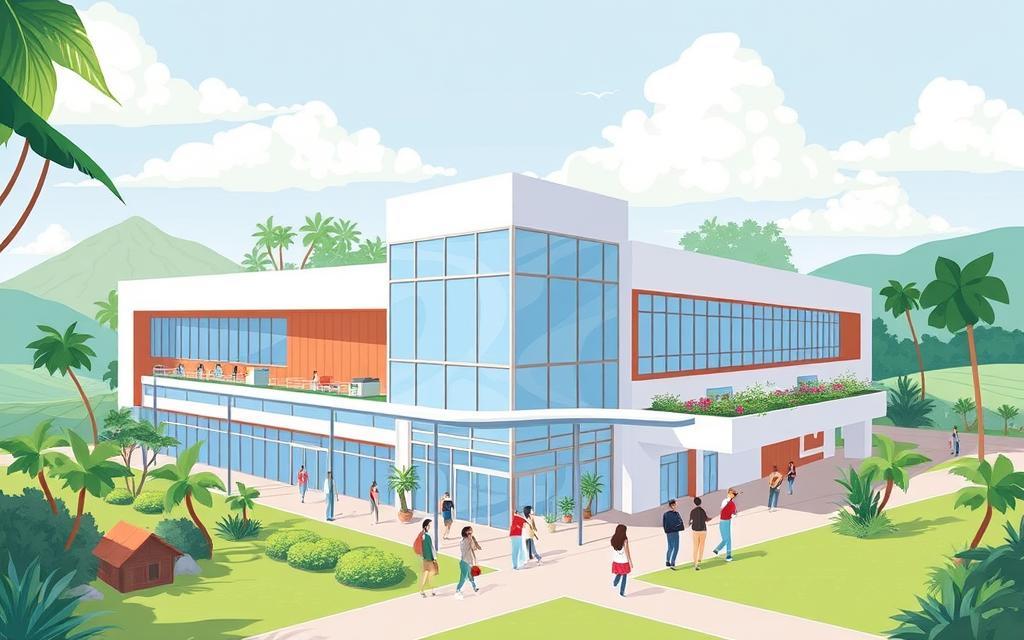Do I need health insurance for Costa Rica residency? We Explain

Costa Rica has become a haven for over 100,000 foreigners seeking a better quality of life. As you consider joining this expat community, understanding the requirements for residency is crucial. One critical aspect is health insurance, a key component in the residency application process.
We will guide you through the essential steps to obtain legal residency in Costa Rica, focusing on the health insurance requirements. Our goal is to ensure a smooth transition to your new life in this beautiful Central American country.
With its renowned healthcare system and welcoming environment, Costa Rica is an attractive destination. We will explore how to navigate the complexities of health insurance to meet the residency requirements.
Costa Rica Residency Overview

Costa Rica offers various residency options for foreigners, each with its own set of requirements and benefits. As we explore the different aspects of Costa Rica residency, it's essential to understand the general requirements that apply to all categories. Any foreign resident in Costa Rica who wants to obtain or renew their legal resident status must provide proof that they are covered by the medical insurance system of the Costa Rica Social Security Administration, known locally as Caja Costarricense de Seguro Social - CCSS.
Popular Residency Categories
Costa Rica has several popular residency categories, including Pensionado (Retiree), Rentista, and Inversionista (Investor). Each category has its own specific requirements and benefits. For instance, Pensionado applicants must demonstrate a minimum monthly income from a pension, while Rentista applicants must show a minimum monthly income from a reliable source outside of Costa Rica.
To learn more about the specific requirements for each category and how to apply, we recommend visiting the official Costa Rican immigration website or consulting with an immigration attorney who can guide you through the application process.
General Requirements for Residency
While the specific requirements may vary depending on the residency category, there are general requirements that apply to all applicants. These include providing a clean criminal record from their country of origin, properly apostilled or authenticated for use in Costa Rica, as well as documentation such as a valid passport, birth certificate, and proof of financial means.
Health insurance coverage is mandatory for all residency applicants, regardless of the category under which they're applying. The application process involves submitting documents to Costa Rica's immigration department (DGME) and attending an in-person appointment. Understanding the general timeline for residency processing is also important for planning your move to Costa Rica effectively.
Do I Need Health Insurance for Costa Rica Residency?

To obtain or renew residency in Costa Rica, having the right health insurance is mandatory. Any foreign resident seeking legal resident status must provide proof of coverage by the Costa Rica Social Security Administration's medical insurance system. This requirement applies to both temporary and permanent residency categories under the Costa Rican Immigration Law.
Legal Requirements for Health Coverage
The Costa Rican government mandates health insurance for all residents as a condition of their residency status. This means that applicants must secure health coverage before their residency can be approved. The application process for residency will require documentation proving adequate health insurance coverage. This is a non-negotiable part of the legal requirements for obtaining or maintaining residency in Costa Rica.
The type of health insurance required is typically coverage under the Costa Rica Social Security Administration (CCSS), although some private insurance options may be acceptable under certain conditions. Ensuring compliance with these regulations is crucial for a successful residency application.
Consequences of Not Having Insurance
Failing to obtain or maintain proper health insurance coverage can have serious consequences for individuals applying for or holding Costa Rican residency. Applications submitted without proof of adequate health insurance will be rejected, resulting in wasted time and application fees. For existing residents, failing to maintain health insurance coverage can lead to the revocation of their residency status during renewal processes.
Without proper insurance, residents may face limited access to healthcare services or be required to pay extremely high out-of-pocket costs for medical treatment. Additionally, legal penalties may apply to those found evading mandatory insurance contributions, potentially affecting future immigration applications. The immigration department and social security administration share information, making it challenging to circumvent insurance requirements without facing consequences.
Understanding the Costa Rican Healthcare System

Residents of Costa Rica have access to a comprehensive healthcare system that includes both public and private healthcare options. This dual system allows individuals to choose the type of care that best suits their needs.
Public Healthcare (CCSS/Caja)
The Caja Costarricense de Seguridad Social (CCSS), or Social Security System, is Costa Rica's public healthcare provider. The cost of this insurance is determined by the income declared in the residency application, with minimum bases set at $1,000 for Pensionado status and $2,500 for Rentista. The CCSS provides comprehensive coverage, making it a vital component of Costa Rica's healthcare landscape.
Private Healthcare Options
Costa Rica boasts a robust private healthcare system, offering high-quality medical services, particularly in the Central Valley region. Private hospitals and clinics often have bilingual staff and physicians trained in the U.S. or Europe, making them accessible to English-speaking residents. Many residents opt for a combination of public and private healthcare, using the CCSS for routine care and private options for specialized treatments. For those considering private healthcare, it's worth exploring health insurance options that can cover these costs.
Mandatory Registration with Social Security (CCSS)
a foreign resident in Costa Rica, understanding the mandatory registration with the Social Security system is crucial for obtaining or renewing your residency status. The Costa Rican Social Security system, known as CCSS, is a comprehensive healthcare system that provides a wide range of medical services to its members.
Who Must Register with CCSS
Any foreign resident seeking to obtain or renew their legal resident status in Costa Rica must register with the CCSS. This requirement applies to all categories of residency, whether temporary or permanent, granted under the Costa Rican Immigration Law. Registration is a prerequisite for residency, and failure to comply may result in the denial of residency status.
The CCSS registration process involves providing proof of medical insurance coverage, which is a mandatory requirement for all foreign residents. This ensures that residents have access to the Costa Rican healthcare system, which is known for its high quality and comprehensive services.
Benefits of CCSS Coverage
The CCSS provides a wide range of benefits to its members, including access to a network of hospitals, clinics, and local health centers throughout Costa Rica. Members receive comprehensive medical services, including preventive care, diagnostic tests, emergency services, surgeries, hospitalization, and prescription medications.
Some of the key benefits of CCSS coverage include:
- Access to specialized care, such as cardiology, oncology, and neurology, with referrals from primary care physicians.
- Inclusion of dental services, although cosmetic dental procedures may have limited coverage.
- Full coverage for maternity care, including prenatal visits, delivery, and postnatal care, for CCSS members and their registered dependents.
- Availability of mental health services, rehabilitation therapy, and home care for certain conditions.
Understanding these benefits helps residents appreciate the value of the CCSS system beyond just meeting residency requirements. By registering with CCSS, residents can access quality healthcare services, ensuring their well-being and that of their families.
Health Insurance Options for Different Residency Categories
type of residency category you apply for in Costa Rica determines your health insurance obligations. Costa Rica offers various residency categories, each with its unique set of requirements and benefits. Understanding these requirements is crucial for a smooth residency application process.
Pensionado (Retiree) Requirements
Pensionados, or retirees, must demonstrate a pension or income that meets the minimum requirements set by the Costa Rican government. For health insurance, Pensionados are required to register with the Caja Costarricense de Seguro Social (CCSS), Costa Rica's public healthcare system. The CCSS contribution is based on the Pensionado's income level. For more information on the legal requirements for residency in Costa Rica, visit Jaros CR.
Rentista Requirements
Rentistas, individuals with a guaranteed income from outside Costa Rica, must show proof of income and health insurance that covers them in Costa Rica. While they are not required to join the CCSS immediately, they must demonstrate that their private insurance meets the minimum coverage requirements set by the Costa Rican government. Rentistas may eventually be required to register with the CCSS if they stay in the country long-term.
Inversionista (Investor) Requirements
Inversionistas, or investors, who invest at least $150,000 in a Costa Rican business or real estate, have specific health insurance requirements. Investors who generate income from their Costa Rican investments may register with the CCSS as employed or self-employed. Those who do not generate income may use the "voluntary" category for CCSS registration. The CCSS contribution amount varies depending on the income generated from the investment. Investors with businesses in Costa Rica must also register their employees with the CCSS and make employer contributions.
The CCSS Registration Process
To ensure access to Costa Rica's renowned healthcare system, understanding the CCSS registration process is essential. This process is a critical step for individuals seeking residency in Costa Rica, as it enables them to obtain the necessary health insurance coverage.
Required Documentation
Gathering all required documentation is the first step in the CCSS registration process. This includes ensuring that all documents are current and properly authenticated. Typically, applicants need to provide personal identification, proof of residency, and income documentation. The primary applicant, who was the main applicant on the immigration application form, will need to provide their information, and their spouse will be included as a dependent on the health insurance portion.
It's crucial to verify the specific documents needed, as requirements may vary depending on the regional CCSS office. Ensuring that all documents are in order will help streamline the application process.
Step-by-Step Application Guide
The CCSS registration process involves several key steps. First, locate your regional CCSS office and determine if appointments are required or if they accept walk-ins. At your appointment, you'll complete application forms with your personal information, residency details, and income declaration to determine your contribution amount.
A personal interview with a CCSS official is typically required, during which they'll review your documentation, verify your income, and calculate your monthly premium. After approval, you'll receive information about making your first payment and obtaining your CCSS membership card, which grants access to healthcare services. Understanding this process helps residents avoid common pitfalls and ensures a smoother registration experience with the Costa Rican healthcare system.
Calculating Your CCSS Insurance Costs
For those seeking residency in Costa Rica, understanding how CCSS insurance costs are calculated is essential. The CCSS (Caja Costarricense de Seguro Social) insurance system requires contributions based on a sliding scale related to income.
Income-Based Payment Structure
The cost of CCSS insurance for the self-insured option is determined by income level. The sliding scale ranges from 11.5% to 18.34% of income, with the percentage increasing as income rises. For residency purposes, only the health coverage portion is typically applied, while the disability and death portion is waived. This determination is made during the interview process with social security.
Payment Methods and Frequency
CCSS payments are typically made monthly, with specific due dates that must be adhered to in order to maintain active coverage. Various payment methods are available, including direct bank transfers, automatic deductions from Costa Rican bank accounts, and in-person payments at designated banks or CCSS offices.
Many residents set up automatic payments through their Costa Rican bank accounts to ensure timely payments. The CCSS provides receipts called "orden patronal" that serve as proof of payment and active coverage, which may be required for residency renewals.
Private Health Insurance Options for Residents

Private health insurance in Costa Rica offers residents a range of choices beyond the mandatory CCSS registration. While CCSS provides comprehensive coverage, private insurance can offer additional benefits and flexibility.
Local Private Insurance Plans
Local private insurance plans in Costa Rica cater specifically to the needs of residents, offering coverage that complements the CCSS system. These plans often provide access to private healthcare facilities and specialists, reducing wait times and enhancing the overall quality of care.
Local plans are typically more affordable than international insurance and are tailored to the Costa Rican healthcare system, making them a practical choice for many residents.
International Health Insurance Policies
International health insurance policies provide worldwide coverage, making them ideal for residents who travel frequently or split their time between Costa Rica and other countries. These policies offer access to a broader network of healthcare providers both within Costa Rica and internationally.
Many international plans include benefits not typically covered by local insurance, such as medical evacuation, repatriation, and treatment abroad for complex conditions. While premium costs are generally higher, they may offer more comprehensive coverage and higher benefit limits.
Digital Nomad Visa and Health Insurance Requirements
As Costa Rica becomes an increasingly popular destination for digital nomads, understanding the health insurance requirements for the Digital Nomad Visa is crucial. The Digital Nomad Visa is designed for individuals who earn at least $3,000 per month or $36,000 annually for singles, or $48,000 for families. To apply for this visa, applicants must secure health insurance that meets specific criteria.
Special Considerations for Digital Nomads
Digital nomads applying for the Costa Rica visa must ensure their health insurance policy covers at least $50,000 for medical expenses and includes COVID-19 coverage. For more information on the required documents, you can visit this resource. It's essential to choose an insurance provider that is recognized by Costa Rican immigration authorities to avoid any complications during the application process.
Acceptable Insurance Providers
Several international insurance companies offer policies that meet Costa Rica's requirements for Digital Nomad visa applicants. Providers like Cigna, Bupa, and IMG specialize in expatriate coverage and have strong networks in Costa Rica. The National Insurance Institute (INS) also offers government-backed insurance plans that are widely accepted. When selecting an insurance provider, it's crucial to verify that they meet the minimum coverage requirements to ensure a smooth visa application process.
Common Challenges and How to Overcome Them
The path to Costa Rica residency is not without its obstacles, which can be daunting for applicants. As you navigate the process, understanding these challenges and how to address them can significantly improve your experience.
Language Barriers During Registration
One of the primary challenges faced by applicants is the language barrier during the registration process. While many Costa Ricans speak some English, official procedures are typically conducted in Spanish. To overcome this, we recommend hiring a local attorney or using translation services to ensure accurate communication.
Understanding Coverage Limitations
Another challenge is understanding the limitations of your CCSS coverage. While the public healthcare system in Costa Rica is comprehensive, there may be certain services or treatments not covered. We suggest thoroughly reviewing your coverage details and asking questions during registration to avoid surprises later.
Navigating Regional Office Requirements
CCSS offices across different regions in Costa Rica may have varying requirements and procedures. To navigate these differences, we advise researching the specific requirements for your regional office before your appointment. Connecting with local expatriate communities can also provide valuable insights into the quirks and requirements of your local CCSS office.
By being aware of these challenges and taking proactive steps, you can streamline your residency application process and ensure a smoother transition to life in Costa Rica.
Expert Tips for a Smooth Insurance Application
To make your Costa Rica residency journey smoother, it's essential to grasp the health insurance requirements and how to fulfill them effectively. A well-prepared application can save you time and reduce stress.
Working with Immigration Attorneys
Legal advisors can help demystify the process and ensure compliance with all necessary regulations. Familiarizing yourself with the different visa categories and residency options will help determine the most suitable path for your unique situation. Staying informed about any recent changes in immigration laws and regulations is also crucial.
By working with experienced immigration attorneys, you can navigate the complexities of Costa Rica's residency requirements with confidence. They can provide valuable insights into the health insurance application process, ensuring you meet all the necessary criteria.
Planning Your Budget for Healthcare Costs
Residents should budget for mandatory CCSS contributions based on their income level and residency category. Consider additional costs for private insurance premiums if you plan to supplement CCSS coverage with local or international private insurance.
- Budget for out-of-pocket expenses for medications, treatments, or services not covered by your insurance plans.
- Factor in potential currency fluctuations if your income is in a foreign currency but your healthcare expenses are in Costa Rican colones.
- Create an emergency healthcare fund to cover unexpected medical expenses or treatments that may require upfront payment.
By understanding these budgeting considerations, you can develop a realistic financial plan for your healthcare needs while living in Costa Rica.
Conclusion
The journey to Costa Rican residency is made easier with a comprehensive understanding of the health insurance requirements. Costa Rica offers various residency options, including rentista, investment, and permanent residency, each with its unique requirements. Health insurance coverage through the CCSS is mandatory for all residency categories, ensuring residents contribute to and benefit from the country's healthcare system. Different residency categories have specific insurance requirements, but the common goal is to provide comprehensive healthcare. We encourage prospective residents to view health insurance as an investment in their wellbeing while enjoying life in Costa Rica. For more information on how long you can stay outside of Costa Rica with residency, visit this resource. Planning for healthcare costs is integral to financial preparation for life in Costa Rica.


